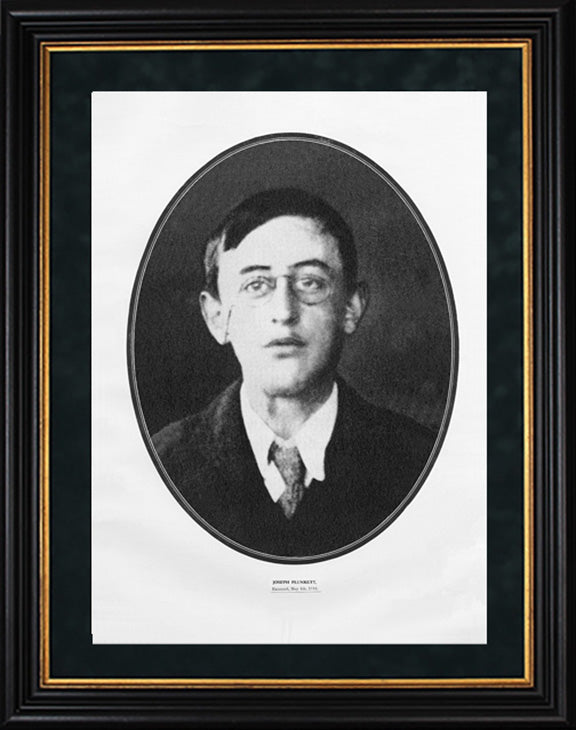The Walton Collection
Joseph Plunkett -1916 Poster
Joseph Plunkett -1916 Poster
Couldn't load pickup availability
Joseph Mary Plunkett 1916 commemorative poster.
Joseph Plunkett was born on the 21st November 1887 and was an Irish republican, poet and journalist. As a leader of the 1916 Easter Rising, he was one of the seven signatories to the Proclamation of the Irish Republic. He was married to Grace Gifford just seven hours before his execution in 1916.
Born at 26 Upper Fitzwilliam Street to parents that came from very affluent backgrounds, Plunkett had contracted tuberculosis in childhood and as a result much of his youth was spent in the Mediterranean and North African warmer climates. While in Algiers he studied Arabic literature and composed poetry in the Arabic language. Educated at the Catholic University School and at Belvedere College in Dublin and later at Stonyhurst College, in Lancashire, he also obtained some military knowledge during a period with the Officers' Training Corps.
During his life, he took an avid interest in Irish heritage and language. He was a member of the Gaelic League and studied alongside Thomas MacDonagh, who became a lifelong friend. The two poets had an strong interest in theatre, and joined the Irish Volunteers shortly after its founding, quickly rising to join the Leagues provisional committee. His interest in Irish freedom from Britsh rule also influenced other memebrs of his family, in particular his younger brothers George and John, and indeed his father, who allowed his property in Kimmage, to be utilised as a training camp for young men who wished to evade conscription.
Joseph Plunkett joined the IRB in 1915 and was subsequently sent to Germany to meet with Roger Casement, who was negotiating for support with the German government on behalf of Ireland. Casement was not then a member of the IRB, who wished to have one of their own contact in Germany to negotiate German aid for an uprising the following year. He was seeking (but not limiting himself to) a shipment of arms. Casement, on the other hand, spent most of his energies recruiting Irish prisoners of war in Germany to form a brigade to fight instead for Ireland. Some nationalists in Ireland saw this as an empty endeavour and preferred to seek weapons. Remarkably, Plunkett successfully got a promise of a German arms shipment to coincide with the Rising.
Plunkett was one of the original members of the IRB Military Committee that was responsible for planning the Easter Rising. Shortly before the rising was to begin, Plunkett was hospitalised following a turn for the worse in his health. He had an operation on his neck glands days before Easter and had to struggle out of bed to take part in the Rising. Still bandaged, he took his place in the General Post Office with several other of the rising's leaders such as Patrick Pearse and Tom Clarke, though his health prevented him from being active. Notably his aide de camp during the Rising was Michael Collins.
Following the surrender, Plunkett was court martialled on the 3rd of May and was kept in Kilmainham Gaol. His Fiancé, Grace Gifford, received news that Joseph was to be executed the following morning. She purchased a ring and persuaded a priest to let her marry Joseph before his execution. Grace and Joseph were married in the prison chapel in Kilmainham jail, just hours before his death. There were only two witnesses (prison guards John Smith and John Lockerby) in addition to the priest. Grace was awoken at 2 am and taken back to the jail where they had their final meeting. A guard counted down their final 10 minutes and Plunkett was executed soon after.
His brothers George Oliver Plunkett and Jack Plunkett had joined him in the Rising and later became important Volunteers. His father's cousin, Horace Plunkett, was a Protestant and unionist who sought reconciliation between unionists and nationalists. Horace Plunkett's home was subsequently burned down by the Anti-Treaty IRA during the Civil War. Plunkett named his sister, Geraldine, the literary executor of his will and she published a volume of his poetry a month after his execution in June 1916.
The Irish ballad "Grace", written by Seán and Frank O'Meara, is a monologue of Plunkett expressing his love to Grace and his love for the cause of Irish independence in the small hours before his execution. This beautiful ballad has been covered by many Irish artist including Jim McCann and in more years by Rod Stewart.
The text below the picture simply states : "JOSEPH PLUNKETT, Executed, May 4th, 1916"
Produced from a poor quality photograph this is still a fine reproduction in the style of the other 1916 leaders commemorative posters, on 210 gsm satin art paper, beautifully mounted on a mottled green suede background and set behind glass in a handmade, aged dark mahogany finish frame with a gold gilt sightline.


